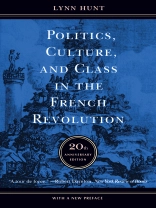When this book was published in 1984, it reframed the debate on the French Revolution, shifting the discussion from the Revolution’s role in wider, extrinsic processes (such as modernization, capitalist development, and the rise of twentieth-century totalitarian regimes) to its central political significance: the discovery of the potential of political action to consciously transform society by molding character, culture, and social relations. In a new preface to this twentieth-anniversary edition, Hunt reconsiders her work in the light of the past twenty years‘ scholarship.
Inhaltsverzeichnis
List of Tables List of Plates
Preface to the Twentieth Anniversary Edition
Acknowledgements to the 1984 Edition
Chronology
Abbreviations
Introduction: Interpreting the French Revolution
PART I: THE POETICS OF POWER
1. The Rhetoric of Revolution
2. Symbolic Forms of Political Practice
3. The Imagery of Radicalism
PART II: THE SOCIOLOGY OF POLITICS
4. The Political Geography of Revolution
5. The New Political Class
6. Outsiders, Culture Brokers, and Political Networks
Conclusion: Revolution in Political Culture
Appendix A: Correlation Matrix of Selected Political, Economic, and Demographic Variables
Appendix B: Occupational Analysis of City Councillors in Amiens, Bordeaux, Nancy, and Toulouse
Index
Über den Autor
Lynn Hunt is the Eugen Weber Professor of Modern European History at the University of California, Los Angeles. She is the author of The Family Romance of the French Revolution (California, 1992) and the editor (with Victoria E. Bonnell) of Beyond the Cultural Turn: New Directions in the Study of Society and Culture (California, 1999). She was President of the American Historical Association in 2002-2003.












